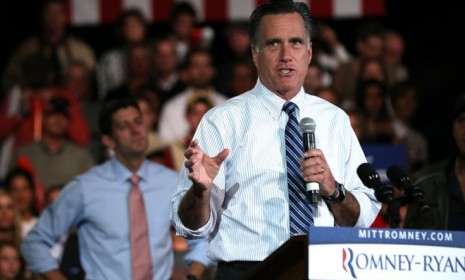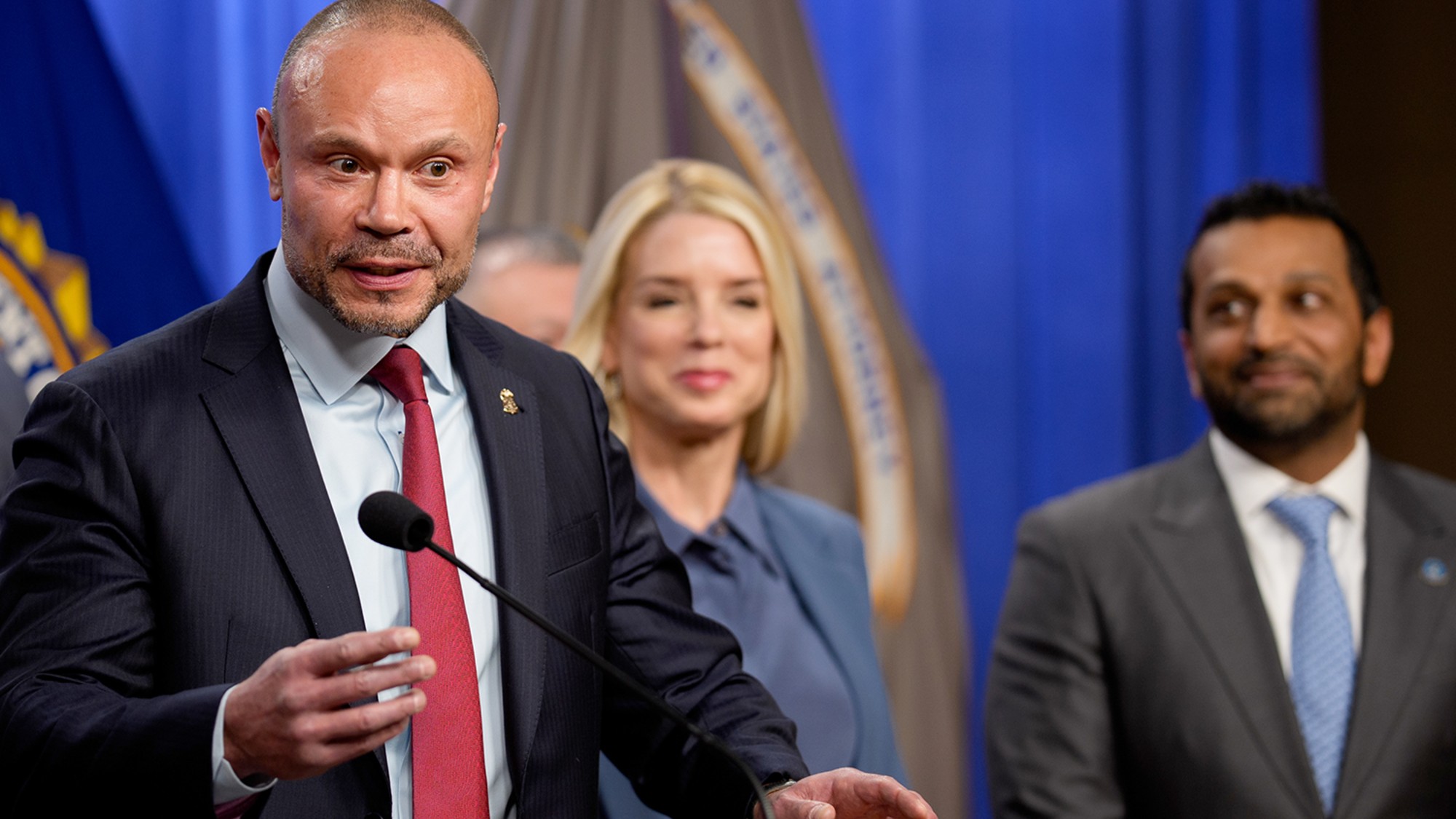The final push: What Mitt Romney needs to do before Election Day
Voters head to the polls in less than two weeks. Here, a guide to Romney's endgame

President Obama and Mitt Romney are in a dead heat as they enter the home stretch of the 2012 presidential race. The two candidates are furiously crisscrossing the country to make their final pitches to voters in battleground states, with the president finishing up a sleepless 38-hour tour to nine states and Romney hitting up three towns in the crucial swing state of Ohio. The debates are over, and, barring an earth-shattering event, the outcome of the race will likely be determined by the work the two campaigns accomplish over the next two weeks. Here, six things Romney needs to do in the final days of the race:
1. Win the closing argument on the economy
The main thrust of Romney's campaign is that Obama has failed to lift the economy, and that the former private equity manager has the expertise to turn it around. It is Romney's most potent argument, and polls show that most voters believe Romney would do a better job than the president on economic issues. With Obama seeking to clarify his economic message, the last thing Romney wants to see is Obama gaining ground on pocketbook issues. The GOP candidate is scheduled to deliver a major address on the economy on Friday, a speech that his campaign hopes will seal the deal.
The Week
Escape your echo chamber. Get the facts behind the news, plus analysis from multiple perspectives.

Sign up for The Week's Free Newsletters
From our morning news briefing to a weekly Good News Newsletter, get the best of The Week delivered directly to your inbox.
From our morning news briefing to a weekly Good News Newsletter, get the best of The Week delivered directly to your inbox.
2. Stick with Moderate Mitt
Romney's late surge in the polls coincided with his abrupt transformation into a moderate on issues ranging from financial regulation to Iran's suspected nuclear weapons program. While he remains committed to turning Medicare into a voucher system and lowering tax rates for the wealthy, Romney has undergone an optical metamorphosis that is attractive to independent voters. "Romney knows that, by substantial margins, the country favors raising taxes on the rich and opposes slashing many government programs, including Medicare and Social Security," says E.J. Dionne at The Washington Post. Convincing voters that he is a centrist is crucial for the GOP challenger, as is beating back charges that he's an oily opportunist or a severe conservative at heart.
3. Distance himself from controversial Republicans
In the same vein, Romney has to divorce himself from extreme members of his own party. In what almost seems like a calculated campaign to sabotage Romney's candidacy, Donald Trump this week offered $5 million to a charity if Obama released his birth and college records, a reminder of the virulent strain of birtherism that runs through the GOP. In addition, Romney's campaign is dealing with the blowback from a controversy surrounding Indiana Senate candidate Richard Mourdock, who said that when a woman becomes pregnant from rape "that's something God intended." Romney has not withdrawn his endorsement for Mourdock, and the Obama campaign is frantically trying to tie the two in the minds of women voters.
A free daily email with the biggest news stories of the day – and the best features from TheWeek.com
4. Become the candidate of change
Romney has recently begun telling voters that they face a distinct choice in this election: The status quo or a "big change." With the economy lurching along at a sluggish pace, and Congress stuck in gridlock, it could be a message that resonates with the electorate. It's also "an attempt at role reversal," say Colleen McCain Nelson and Laura Meckler at The Wall Street Journal, "as the Republican presidential nominee tries to own the message that [Obama] used effectively in 2008 to persuade voters that he could move the country beyond its partisan stalemate." Hey, it worked for Obama.
5. Act like a frontrunner
While Obama at times appears to be playing the role of underdog, Romney clearly relishes portraying himself as the frontrunner in the race. "Cultivating the image that he is a winner, his aides say, could be Mr. Romney's best strategy for actually winning," say Jeff Zeleny and Ashley Parker at The New York Times. At campaign rallies Romney has described the Obama campaign as "sinking," while touting his own inevitable march into the Oval Office, a tactic that seems to jazz up the Republican base. One of the biggest applause lines at his rallies is when he begins sentences with: "If I'm elected — no, when I'm elected...."
6. Chip away at Obama's lead in Ohio
Even the most confident Romney supporter has to quail a little in the face of cold, hard math. Obama is holding on to a slim but consistent lead in Ohio, whose 18 electoral votes could help him reach the winning threshold of 270. There are scenarios in which Romney can win without Ohio, but the odds are daunting: Political observers say he would have to run up victories in swing states that are toss-ups, as well as one or two that are currently leaning toward Obama. Expect to see a lot of Romney in the Buckeye State in the coming days.
Sources: ABC News, The Associated Press, Fox News, The Hill, The New York Times, TIME, Twitter, The Wall Street Journal, The Washington Post
Read more political coverage at The Week's 2012 Election Center.
-
 Pipe bombs: The end of a conspiracy theory?
Pipe bombs: The end of a conspiracy theory?Feature Despite Bongino and Bondi’s attempt at truth-telling, the MAGAverse is still convinced the Deep State is responsible
-
 The robot revolution
The robot revolutionFeature Advances in tech and AI are producing android machine workers. What will that mean for humans?
-
 Health: Will Kennedy dismantle U.S. immunization policy?
Health: Will Kennedy dismantle U.S. immunization policy?Feature ‘America’s vaccine playbook is being rewritten by people who don’t believe in them’
-
 Has Zohran Mamdani shown the Democrats how to win again?
Has Zohran Mamdani shown the Democrats how to win again?Today’s Big Question New York City mayoral election touted as victory for left-wing populists but moderate centrist wins elsewhere present more complex path for Democratic Party
-
 Millions turn out for anti-Trump ‘No Kings’ rallies
Millions turn out for anti-Trump ‘No Kings’ ralliesSpeed Read An estimated 7 million people participated, 2 million more than at the first ‘No Kings’ protest in June
-
 Ghislaine Maxwell: angling for a Trump pardon
Ghislaine Maxwell: angling for a Trump pardonTalking Point Convicted sex trafficker's testimony could shed new light on president's links to Jeffrey Epstein
-
 The last words and final moments of 40 presidents
The last words and final moments of 40 presidentsThe Explainer Some are eloquent quotes worthy of the holders of the highest office in the nation, and others... aren't
-
 The JFK files: the truth at last?
The JFK files: the truth at last?In The Spotlight More than 64,000 previously classified documents relating the 1963 assassination of John F. Kennedy have been released by the Trump administration
-
 'Seriously, not literally': how should the world take Donald Trump?
'Seriously, not literally': how should the world take Donald Trump?Today's big question White House rhetoric and reality look likely to become increasingly blurred
-
 Will Trump's 'madman' strategy pay off?
Will Trump's 'madman' strategy pay off?Today's Big Question Incoming US president likes to seem unpredictable but, this time round, world leaders could be wise to his playbook
-
 Democrats vs. Republicans: who are US billionaires backing?
Democrats vs. Republicans: who are US billionaires backing?The Explainer Younger tech titans join 'boys' club throwing money and support' behind President Trump, while older plutocrats quietly rebuke new administration